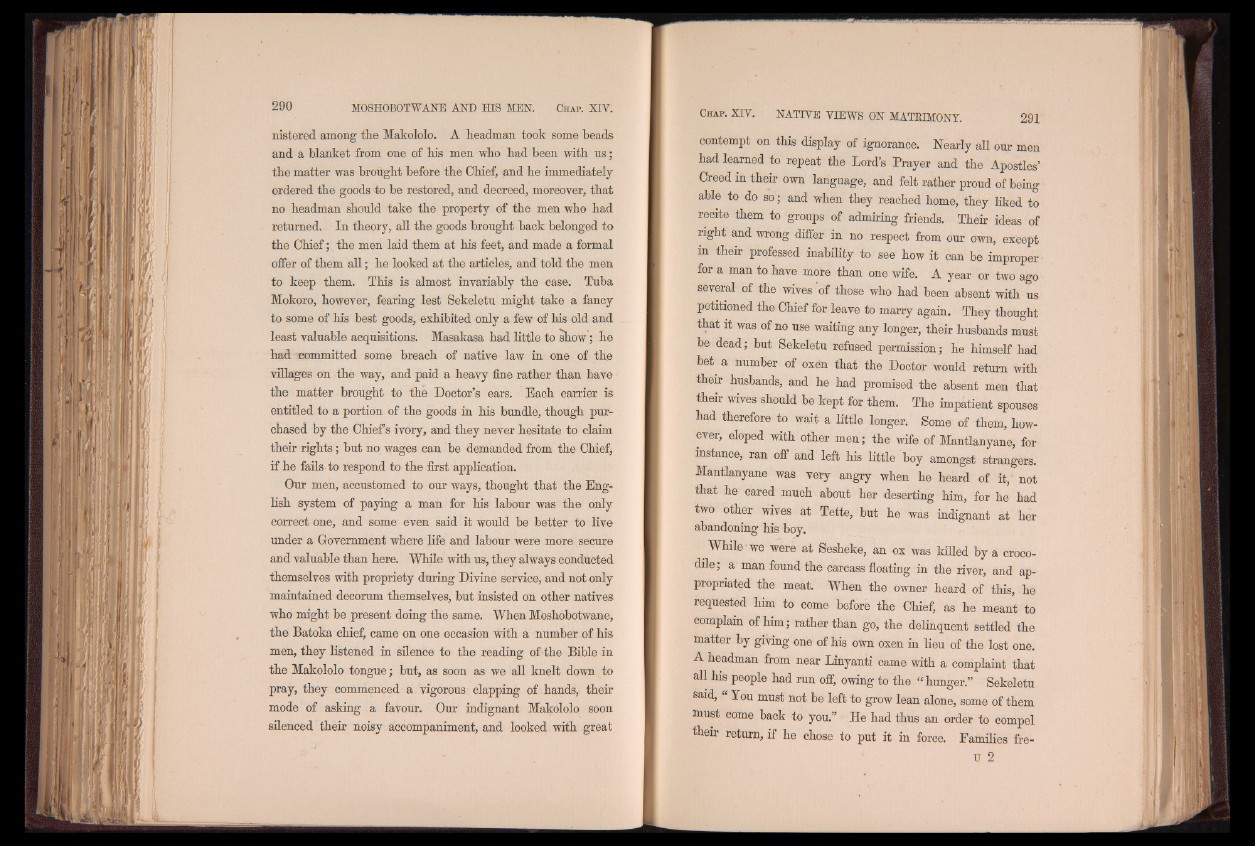
nistered among the Makololo. A headman took some beads
and a blanket from one of his men who had been with u s ;
the matter was brought before the Chief, and he immediately
ordered the goods to be restored, and decreed, moreover, that
no headman should take the property of the men who had
returned. In theory, all the goods brought back belonged to
the Chief; the men laid them at his feet, and made a formal
offer of them a ll; he looked at the articles, and told the men
to keep them. This is almost invariably the case. Tuba
Mokoro, however, fearing lest Sekeletu might take a fancy
to some of his best goods, exhibited only a few of his old and
least valuable acquisitions. Masakasa had little to show; he
had committed some breach of native law in one of the
villages on the way, and paid a heavy fine rather than have
the matter brought to the Doctor’s ears. Each carrier is
entitled to a portion of the goods in his bundle, though purchased
by the Chiefs ivory, and they never hesitate to claim
their rights; but no wages can be demanded from the Chief,
if he fails to respond to the first application.
Our men, accustomed to our ways, thought that the English
system of paying a man for his labour was the only
correct one, and some even said it would be better to live
under a Government where life and labour were more secure
and valuable than here. While with us, they always conducted
themselves with propriety during Divine service, and not only
maintained decorum themselves, but insisted on other natives
who might be present doing the same. When Moshobotwane,
the Batoka chief, came on one occasion with a number of his
men, they listened in silence to the reading of the Bible in
the Makololo tongue; but, as soon as we all knelt down to
pray, they commenced a vigorous clapping of hands, their
mode of asking a favour. Our indignant Makololo soon
silenced their noisy accompaniment, and looked with great
contempt on this display of ignorance. Nearly all our men
had learned to repeat the Lord’s Prayer and the Apostles’
Creed in their own language, and felt rather proud of being
able to do so; and when they reached home, they liked to
recite them to groups of admiring friends. Their ideas of
right and wrong differ in no respect from our own, except
in their professed inability to see how it can be improper
for a man to have more than one wife. A year or two ago
several of the wives of those who had been absent with us
petitioned the Chief for leave to marry again. They thought
that it was of no use waiting any longer, their husbands must
be dead; but Sekeletu refused permission; he himself had
be\ a Mmber of oxen that the Doctor would return with
their husbands, and he had promised the absent men that
their wives should be kept for them. The impatient spouses
had therefore to wait a little longer. Some of them, however,
eloped with other men; the wife of Mantlanyane, for
instance, ran off and left his little boy amongst strangers.
Mantlanyane was very angry when he heard of it, not
that he cared much about her deserting him, for he had
two other wives at Tette, but he was indignant at her
abandoning his boy.
While we were at Sesheke, an ox was killed by a crocodile;
a man found the carcass floating in the river, and appropriated
the meat. When the owner heard of thin, he
requested him to come before the Chief, as he meant to
complain of him; rather than go, the delinquent settled the
matter by giving one of his own oxen in lieu of the lost one.
A headman from near Linyanti came with a complaint that
all his people had run off, owing to the “ hunger.” Sekeletu
said, You must not be left to grow lean alone, some of them
must come back to you.” He had thus an order to compel
their return, if he chose to put it in force. Families freu
2